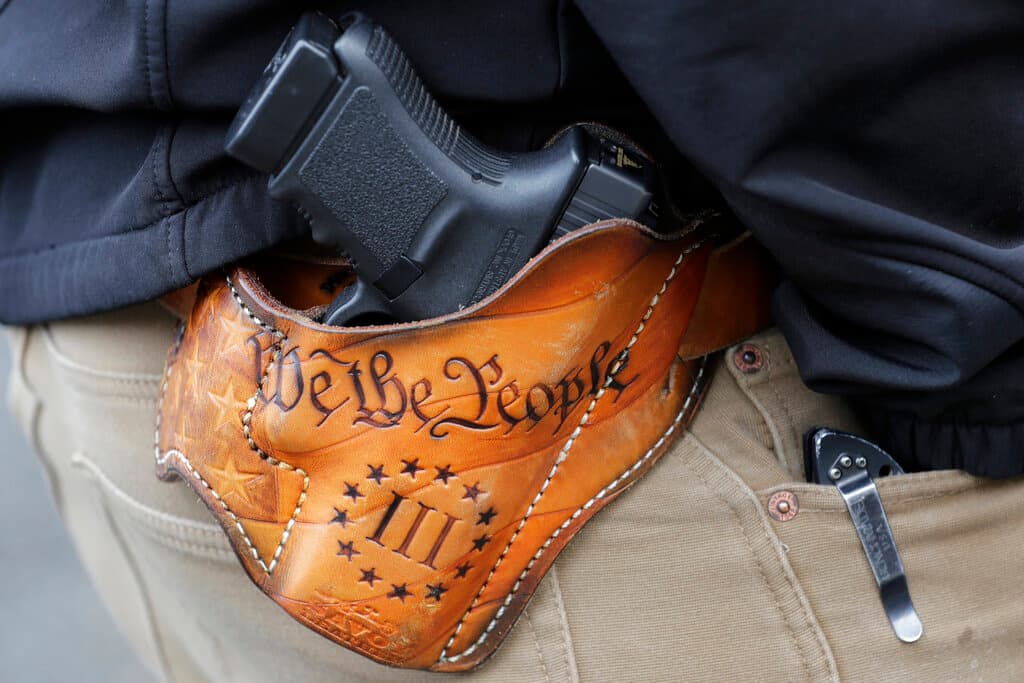Pro-Gun Legislators Highlight ‘Racist’ Gun Laws To Justify Easing Restrictions in Nebraska, North Carolina
A bipartisan group of legislators in two states contends that some restrictions on gun ownership unfairly impact minorities.

A group of pro-gun state legislators — of both parties, from two different states — is seeking to drastically reduce the burden on those who want to obtain concealed carry permits. Their novel reasoning? Restrictions on gun ownership are “racist.”
Nebraska is barreling toward a permitless or “constitutional” carry law that would allow residents to carry concealed weapons without obtaining a permit. At the same time, North Carolina Republicans want to repeal a 1919 law that forced residents to get a permit to carry handguns.
Two Black legislators in Nebraska have joined their Republican colleagues in supporting a permitless carry bill because, they say, non-white youths are far more likely to be charged with possession of a handgun in urban Omaha than young people in rural areas.
Senator Justin Wayne, a Black Democrat from Omaha, testified before a legislative committee in support of this bill earlier this month.
“How many young African American and Latino kinds are affected by Omaha’s gun laws?” he asked his colleagues. Omaha, the most populous and diverse city in the state, has their own local ordinances about firearms permitting.
Mr. Wayne says the restrictions on gun ownership result in higher arrest rates for young Black and Hispanic men because they are less likely to be approved for a permit and police are more likely to search them.
The police “aren’t talking about kids in Bennington, they’re not talking about kids in western Nebraska,” Mr. Wayne said, referring to two overwhelmingly white areas of the state.
Another senator, Terrell McKinney, echoed Mr. Wayne’s sentiments. “The police don’t care about Black people,” Mr. McKinney said, saying his support for permitless carry is an example of him “fighting” for his community’s safety.
The Omaha police department opposes the constitutional carry bill, saying it would make it harder for them to stop dangerous criminals who would be allowed to carry weapons in public.
“There is no way to prevent the carrying of an assault weapon,” said Omaha police chief Todd Schmaderer at a recent committee hearing. “So, you can walk around a populated city, outdoor venues of the College World Series, concerts, police crime scenes, places of protests. You get the picture. There is nothing we could do about it at that point in time.”
The two Democrats have joined the Republican cosponsor, Senator Tom Brewer, in pushing for the bill. Mr. Brewer first introduced the bill to ensure the safety of his own community — he is a member of the Oglala Lakota tribe. He said a colonial law that barred native Americans from owning weapons made his people less safe, and now wants to ensure his community can defend itself.
The Nebraska legislature passed a procedural motion to debate the bill by a margin of 36 to 12.
North Carolina Republicans are also working on a permitless carry bill, but it would only apply to handguns and is not likely to be adopted given Governor Cooper’s opposition.
A Jim Crow-era law that allowed county sheriffs to deny handgun permit applications was not passed with the explicit purpose of barring Black citizens from owning guns, but experts say that it was the intended result.
Republican state representative Jeff McNeely told local affiliate CBS17 that empowering sheriffs to deny permits kept most Black applicants from getting their permits. “You can go and look at the gun registry there and try to trace that lineage” and check the race of those who were granted permits, he said. “I think you’d find very, very few [Black permit holders].”
The executive director for the Duke University Center for Firearms Law, Andrew Willinger, said the law might have had an effect along those lines, but was not explicitly written to bar Black citizens from owning guns. “My suspicion is that the law was being applied differently in different places across the state,” he said.
A Black sheriff, however, agrees with Mr. McNeely’s assessment of the law, but believes it should stay in place. “Sure the law was racist in 1919,” said Mecklenburg County Sheriff Garry McFadden. “But now, we’re here, and now saying allow the sheriff to do their job.”
A study from two Clemson University economists found that Black Americans were far less likely to be lynched during the Jim Crow era if they personally owned a firearm. “State bans on pistols and increases in white law enforcement personnel served as mechanisms to disarm the Black community, while having no comparable effect on white firearms,” they wrote.

